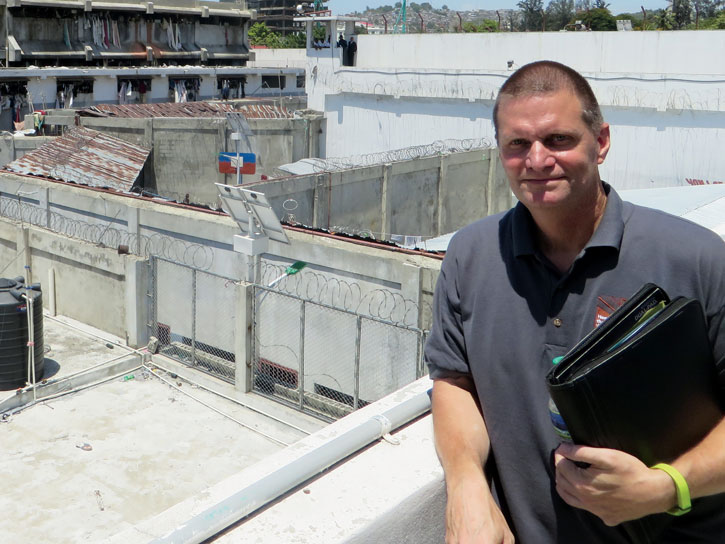Background
A graduate of the University of Notre Dame and Loyola-Stritch School of Medicine, May has donated his time and talents to a variety of organizations from childhood, volunteering in soup kitchens in Chicago and helping establish a home for unwed mothers during his undergraduate years. After spending a year in West Africa and completing his residency, May learned of opportunities within the Cook county jail system. “ I soon realized that providing healthcare to incarcerated persons allowed me a chance to make a real difference in persons’ lives, and, although challenging and often thankless, a means to serve others in significant ways,” he says. “I have continued with jail medicine ever since.”
Health through Walls
After watching a segment on 60 Minutes that sought to expose the misuse of monies directed toward justice reform in Port-au-Prince, May was inspired to make a difference. Two years later he made it to Haiti and was horrified by what he saw. “I became determined then to do whatever I could,” he says. “I have made trips to Haiti and the National Penitentiary nearly every month since that time.” At first filling his own suitcases (and other volunteers’) with medicine, soap and supplies, May eventually formalized his efforts into Health through Walls in 2005. “Other countries also sought our assistance, and we began work in the prisons of Dominican Republic and Jamaica. We have also done work in Africa, including Malawi, Tanzania, Ghana and Democratic Republic of Congo. Our program in Haiti now employs more than 120 persons, works in each of Haiti’s 16 prisons,” says May.
An End to Infectious Disease
Although the focus of the organization is on infectious diseases such as HIV and Tuberculosis, they also place emphasis on human rights, stigma reduction, and rehabilitation. With hundreds receiving care each month, May says it’s hard to pinpoint his proudest moment, but a 2012 initiative that brought in mobile, digital X-ray machines is one source of pride. “Several critics, including international agencies, believed such technology was too sophisticated or costly for the prison of a poor country,” explains May, who is also the Chief Medical Officer at Miami-based Armor Correctional Health Services. “But because we knew it to be the most effective way to identify tuberculosis among more than 10,000 Haitian prisoners, we advocated to make it happen.” Since then the machines has identified and led to the treatment of hundreds of prisoners, with Miami-based radiologist Dr. Irving Waldman reading more than 30,000 X-rays. “The program appears in a publication this year of the World Health Organization highlighting best practices of tuberculosis control in prisons,” says May.
Helping Hands
From his own company’s financial donations to equipment from the Broward Sheriff’s office, and training opportunities via the Miami-Dade Corrections and Florida Department of Corrections, the South Florida community has rallied around the organization. “Individuals have made significant financial or material donations over the years, such as a $25,000 donation to establish a sanitation and hygiene program from a Florida physician, and equipment such as exam tables, wheelchairs, dental supplies and more.” Moving forward, May hopes to respond to requests from prison systems around the globe. “I have been inside the prisons in dozens of poor countries and find nearly universal overcrowding, desperate situations and community ambivalence, at best,” he says. “The needs are enormous and we are able to make a difference.”










 Deering Estate
Deering Estate
 Massage Envy South Miami
Massage Envy South Miami
 Calla Blow Dry
Calla Blow Dry
 My Derma Clinic
My Derma Clinic
 Sushi Maki
Sushi Maki
 Sports Grill
Sports Grill
 The Healthy Kitchen
The Healthy Kitchen
 Golden Rule Seafood
Golden Rule Seafood
 Malanga Cuban Café
Malanga Cuban Café

 Kathleen Ballard
Kathleen Ballard
 Panter, Panter & Sampedro
Panter, Panter & Sampedro
 Vintage Liquors
Vintage Liquors
 The Dog from Ipanema
The Dog from Ipanema
 Rubinstein Family Chiropractic
Rubinstein Family Chiropractic
 Your Pet’s Best
Your Pet’s Best
 Indigo Republic
Indigo Republic




 ATR Luxury Homes
ATR Luxury Homes


 2112 Design Studio
2112 Design Studio
 Hamilton Fox & Company
Hamilton Fox & Company
 Creative Design Services
Creative Design Services
 Best Pest Professionals
Best Pest Professionals
 HD Tree Services
HD Tree Services
 Trinity Air Conditioning Company
Trinity Air Conditioning Company
 Cisca Construction & Development
Cisca Construction & Development
 Mosquito Joe
Mosquito Joe
 Cutler Bay Solar Solutions
Cutler Bay Solar Solutions


 Miami Royal Ballet & Dance
Miami Royal Ballet & Dance
 Christopher Columbus
Christopher Columbus
 Pineview Preschools
Pineview Preschools
 Westminster
Westminster
 Carrollton
Carrollton
 Lil’ Jungle
Lil’ Jungle
 Frost Science Museum
Frost Science Museum
 Palmer Trinity School
Palmer Trinity School
 South Florida Music
South Florida Music
 Pinecrest Orthodontics
Pinecrest Orthodontics
 Dr. Bob Pediatric Dentist
Dr. Bob Pediatric Dentist
 d.pediatrics
d.pediatrics
 South Miami Women’s Health
South Miami Women’s Health

 The Spot Barbershop
The Spot Barbershop
 My Derma Clinic
My Derma Clinic




 Miami Dance Project
Miami Dance Project

 Rubinstein Family Chiropractic
Rubinstein Family Chiropractic
 Indigo Republic
Indigo Republic

 Safes Universe
Safes Universe
 Vintage Liquors
Vintage Liquors
 Evenings Delight
Evenings Delight





 Atchana’s Homegrown Thai
Atchana’s Homegrown Thai
 Baptist Health South Florida
Baptist Health South Florida

 Laser Eye Center of Miami
Laser Eye Center of Miami
 Visiting Angels
Visiting Angels
 OpusCare of South Florida
OpusCare of South Florida

 Your Pet’s Best
Your Pet’s Best





 HD Tree Services
HD Tree Services
 Hamilton Fox & Company
Hamilton Fox & Company


 Creative Design Services
Creative Design Services